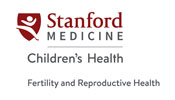Contact us
If you would like to learn more or if you are ready to make an appointment, please call or email our team.
Notice of West building lobby closure at Lucile Packard Children’s Hospital Stanford
Our surgeons treat a variety of conditions that can cause infertility. These include, but are not limited to:

Connect with us:
Download our App: